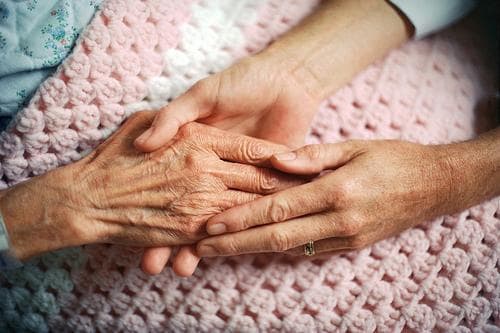Advertisement
Forgive. And Other Caregiving Lessons From My Mother's Dementia

Here's a striking statistic: Four in 10 American adults care for an ailing or elderly family member, according to a study released this week by the Pew Research Center's Internet and American Life project. The numbers have been rising as the population ages and more people live with chronic illnesses, and that rise is expected to continue. Here, non-profit CEO Tiziana Dearing shares her own family's newly learned caregiving lessons.
By Tiziana Dearing
Guest contributor
My mother has dementia and is degenerating. I struggle to find the words to describe how hard that is. Then again, if you have a loved one suffering severe dementia, I don’t need to tell you what it’s like. And if you don’t, I don’t think I could.
Last weekend, my sisters and I convened at my parents’ home to discuss how to support Mom and Dad through this difficult transition. We shared our feelings, our concerns, and the things we have learned so far – both from supporting Mom and through advice from close friends and colleagues who have had similar experiences.
On the trip home, I realized that if we found all these lessons and advice useful, other people might, too. So for those of you struggling, here’s what I would share with you so far.
First, I am so sorry that you and your loved one find yourselves here. Not every moment is bad, though. Find the moments that give you joy and share them. Out loud. You’ll get to live them twice that way and they will help sustain you.
If caring for a loved one with dementia were easy, there wouldn’t be an entire industry built around it.
Second, not all dementia is the same. For example, frontotemporal dementia, the type my mother has, can cause personality change that is not typical in Alzheimer’s disease. Make sure you know what form of dementia your loved one has, and learn what it really will mean for him or her.
Those directly involved in providing care for someone probably have this information, but maybe not. And if you are that brother, sister or in-law who is only partially involved, I am especially talking to you. It can be hard to face the details, especially things like symptoms to anticipate and impact on life expectancy. Nevertheless, you need – and want – to know. As the disease progresses, you can’t imagine how helpful it is to know what’s “normal” for your loved one and what truly is unexpected or might be a symptom of something else.
Third, you can ask for a family meeting.
Dementia is confusing enough, and it’s usually not the only thing happening medically. A family meeting helps clarify what’s going on for everyone involved. In it, the doctors will discuss your loved one’s condition and answer questions.
In our case, Mom and Dad asked for the meeting, and they chose who could come. Mom’s doctors even gave us a call-in number for those siblings who were far away, like me. That conversation was priceless, and got us all on the same page early in Mom’s care.
Fourth, there is an incredible resource out there called a geriatric care manager. My husband is a geriatric psychiatrist, and one of the most common pieces of advice he gives to our friends who find themselves where I am now is to contact one. The geriatric care manager will help you understand better what is happening to your loved one, figure out what kind of care she or he needs now and in the future, identify what insurance will cover, and even help you broker the care.
As my husband says, “If caring for a loved one with dementia were easy, there wouldn’t be an entire industry built around it. It’s okay to ask for some help.” Some insurances cover care managers. Most don’t. If you can find a way to afford it, it will be worth it for your stress level and peace of mind.
Forgive yourself for the moments when you want it to be over.
Last, be forgiving – of yourself and your loved one. Forgive your loved one for the emotional things they can’t give you any more. Forgive them for being so changed, and for leaving you while they are still right in front of you. Of course there is nothing actually to forgive. Forgive them anyway.
Forgive yourself for anger and impatience. Forgive yourself for not being very good at caring for someone with dementia, and for wishing you didn’t have to sometimes. Forgive yourself for the moments when you want it to be over, and the moments immediately after those when you disgust yourself. Forgive yourself for all of it. Then try harder, and forgive yourself again.
You are not alone, and neither is the one you love. This feels hard because it is hard. But you can do it, and there are people who can help.
I am pulling for you.
Tiziana Dearing is a nonprofit CEO. She also writes and lectures about poverty, policy and social justice and is an associate professor of practice in social innovation and leadership. She is a regular contributor to WBUR's Cognoscenti blog.
This program aired on June 21, 2013. The audio for this program is not available.